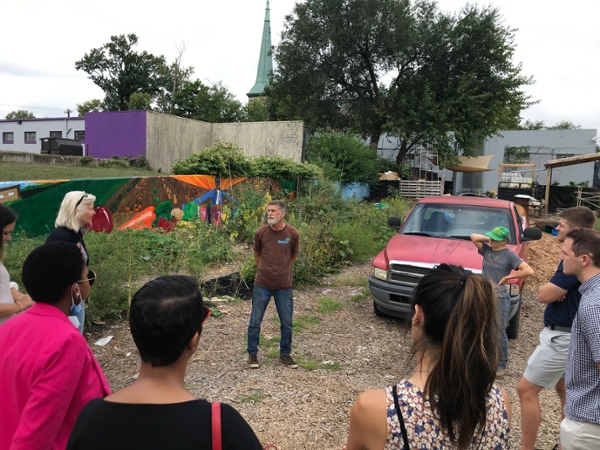NURS 753: Community Nursing and Public Health Policy Practicum

Instructors: Alyssa Hayes, Angel Hoch
This semester, College of Nursing students enrolled in the Master of Science in Nursing and second degree MIDAS program had an opportunity to apply real-world skills in their Community Nursing and Public Health Policy Practicum (NURS 753). Traditionally, the course divides each semester into a clinical experience and a defined community project. Instructors Alyssa Hayes and Angel Hoch integrated neighborhood partnerships into their courses to enhance and inform the community projects with support from Director of Nursing, Debbie VanKuiken, and the Eigel Center. Once matched with a community, students were tasked with getting to know each neighborhood’s strengths and needs before proposing an intervention in response to a challenge as defined by its residents.
Hayes’ students immersed in the City of Norwood, while Hoch’s cohort immersed in the nearby neighborhood of Walnut Hills. As part of their assignments, both student groups gathered population and geographic data and completed a windshield survey of their respective community. Next, student teams began meeting with local leaders to expand upon their understanding of the neighborhood’s assets and to explore residents’ health-based concerns. Each community offered a different and unique set of challenges for the nursing cohorts to consider.
After initial meetings with community leaders, the students developed plans to inform their work including consulting additional community and academic resources to parse out population statistics, and existing data identifying social factors and health status indicators related to community health. Hayes’ cohort in Norwood focused on vaping usage in high school students, and related prevention strategies. Their work included hosting focus groups and extensive interviews with Norwood City School’s personnel. For Hoch’s class in Walnut Hills, food insecurity and its relationship to poor health was the most common refrain from community discussions. They toured several community gardens, and worked directly with the food access coordinator at the Walnut Hill’s Redevelopment Foundation. For their intervention, students primarily focused on food insecure adults who experience imbalanced nutrition based on lack of access to produce and healthy food.
The Walnut Hill’s cohort goal was to promote healthy eating using available and affordable community resources. Students created recipe cards featuring healthy, low cost recipes with ingredients that can be sourced through one of eight community gardens, or purchased at the Healthy Harvest Mobile Market and shops in the community. The students even tested out their recipes with residents at one of the community food access events. Ashley Horner, a MIDAS student, observed:
“When we brought our recipes to the Healthy Harvest Mobile Market, we had a great turnout and received positive feedback from community leaders and Walnut Hills’ residents. I feel that it was vital working directly with community in order to assist them in continuing our intervention in Walnut Hills for years to come.”
As a culmination of their project, the student cohort provided a three-part report detailing the information they gathered throughout the semester focusing on promoting healthy eating and making nutritious foods available. They also produced a short video that documented their progress, the results of their research, and explained their proposed intervention.
Following her cohort’s final presentation, Horner reflected on her class and service experience in Walnut Hills:
“I was particularly interested in this community course because I felt that it would spark my interest in other fields of nursing. I felt that this course opened my eyes to new ideas and how I can use my nursing skills in the community setting.”
Check out the students’ final video project here.